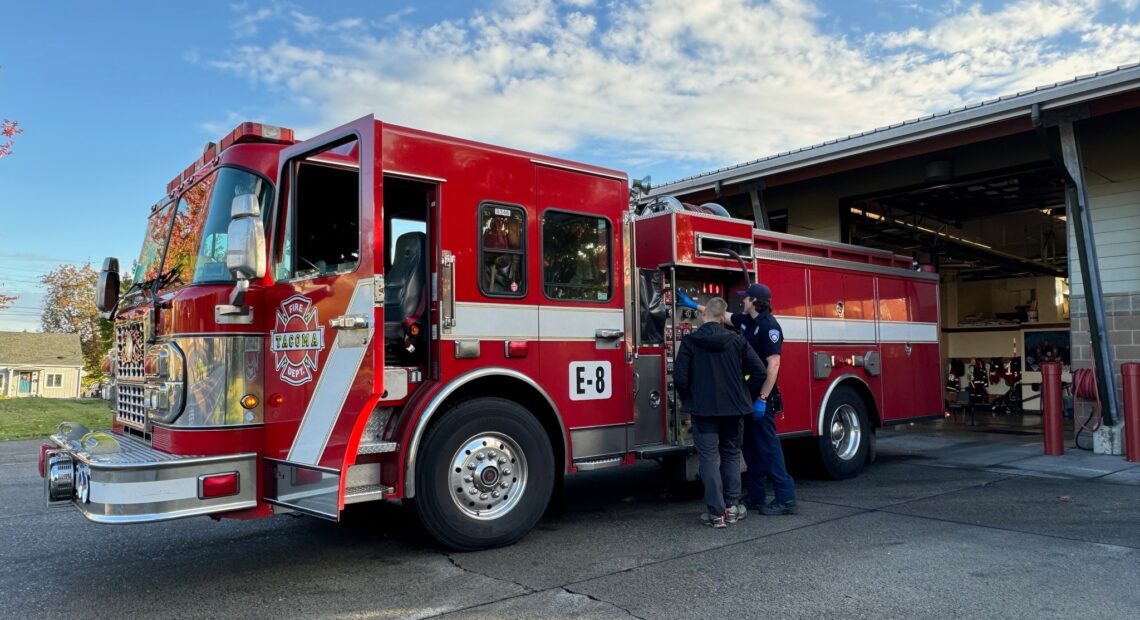
Firefighters voice frustrations over struggling Tacoma city budget
Listen
(Runtime 1:04)
Read
The City of Tacoma has a budget problem; its expenses are higher than its revenue. That means the city has a projected structural deficit of $24 million for the 2025-26 biennial budget.
Staff and city council members have been working to balance that, and one thing they’re proposing cutting has a lot of community members upset.
One idea to lessen that deficit is to cut 16 rover positions that the Tacoma Fire Department implemented last year to respond to more employee leave.
Rover firefighters are not assigned to a particular shift but instead, float to different stations where there is a need. Like substitute teachers, these first responders fill in when a colleague can’t work.
Getting rid of these positions would put $4.2 million back into the general fund.
“That’s 4.2 million that they’re trying to take away from a budget that we don’t have. We need every dollar that we can get for fire,” said Allyson Hinzman, who is president of the International Association of Firefighters Local 31, which represents Tacoma firefighters.
The staffing method has helped lessen overtime. Fire Chief Sionna Stallings-Ala’ilima said there would be months when over 50 employees were being given mandatory overtime in 2023; this year it’s been around 10 a month.
If the city moves forward with this proposal, no firefighters would lose their jobs; the 16 rovers would be reassigned to specific shifts. But just like if there were no substitute teachers, that could mean fewer options when a firefighter is on leave. If there weren’t enough staff to fill shifts, the department would have to choose whether to implement mandatory overtime or “brownout” a station. That means taking it out of service for stretches of time to flex staffing.
The fire department has been underfunded in Tacoma for years, Hinzman said.
“What we need is steady funding to help with the fleet replacement program, to help get the number of personnel that we need to do the job and provide adequate level service, and then also to upgrade our facilities on top of that,” Hinzman said.
A levy presented to Tacoma voters this fall would have brought in an estimated $30 million a year to help fund the department. $10 million of that would have gone toward existing expenses and $20 million to new expenditures. The levy failed.
Many Tacoma firefighters attended a public hearing on the budget on Nov. 19. Many voiced their frustrations with how they feel the city has not met department needs for years.
“Study after study throughout the decades have shown that we need more rigs, more stations and more people on the ground,” shared firefighter Kris Hampton. “Yet here we are looking at a cut, which is absolutely going to lead to scary, dangerous times to our citizens.”
The Tacoma Fire Department is short on personnel, with older stations and older apparatus. It doesn’t have a program for fleet replacement of fire apparatus. During the public hearing, firefighters shared how this can impact their ability to respond.
“Last Sunday, I was driving an ambulance with a patient in the back, and our transmission slipped several times. I didn’t know if we were going to make it to the emergency room,” said Kate van den Brant, who has been with the department since 2008.
While the proposed budget for the department has actually gone up from the last budget, Hinzman and others take issue with how dollars are being allocated.
About $3 million is allocated for the department’s Holistic Outreach Promoting Engagement (HOPE) program, which Hinzman and others say doesn’t have enough support at this time to be functional and help firefighters. The team was established in 2023 to respond to behavioral health crises.
According to Hinzman, HOPE responds to less than one call a day and because of a lack of programs in the county. Often firefighters are dispatched to these calls as well, to take community members experiencing behavioral health crises into the emergency room.
“It’s just been very frustrating to see millions be put into this program when they’re not set up for success and we have critical core services that are underfunded in the city,” Hinzman said.
That program is funded by the Mental Health and Substance Use Disorder Sales Tax.
City council members debated funding allocation in a study session the day after the city council meeting.
Mayor Victoria Woodards shared her commitment to the fire department during the meeting, as well as her thought process behind the decision making.
“We have to look at the entire system,” Woodards said. “I understand the frustration that the HOPE team isn’t working the way we wanted it to and it isn’t supporting fire, but it is supporting our community and we have to give it a chance to work.”
One future option for the department could be leaving the city.
“We understand that right now with how we do business, we’re not providing an adequate level of service to the citizens of Tacoma, so let’s look at some other alternatives,” Hinzman said.
The position of the union is that the department should seriously consider leaving the city’s jurisdiction and becoming a fire district, according to Hinzman.
“We’re at that breaking point, and the amount of money it’s going to make fire whole is truly something that’s going to be very difficult for the city to overcome,” Hinzman said.
One firefighter, Jon Quon, summed up the frustration of many of his colleagues:
“We, the willing, led by the unqualified, have done so much with so little for so long that we now attempt the impossible with nothing at all,” Quon said.
















